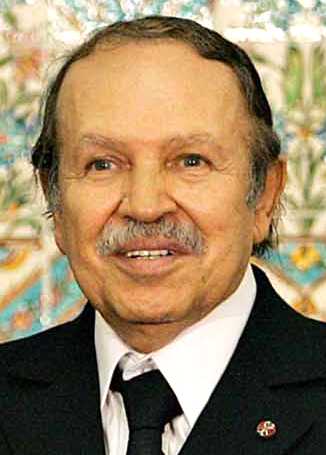 Algerian municipal government authorities announced Monday that they had banned an opposition rally calling for an end to Algerian President Abdelaziz Bouteflika's rule. WL Central reported on the planned rally and the unrest in Algeria here. The authorities said the protest could be held in an indoor venue instead of being a march, but the opposition Rally for Culture and Democracy (RCD) said it would defy the order and go ahead with the march.
Algerian municipal government authorities announced Monday that they had banned an opposition rally calling for an end to Algerian President Abdelaziz Bouteflika's rule. WL Central reported on the planned rally and the unrest in Algeria here. The authorities said the protest could be held in an indoor venue instead of being a march, but the opposition Rally for Culture and Democracy (RCD) said it would defy the order and go ahead with the march.
Today sixteen people were injured, including eleven police, during a violent protest in Skikda, eastern Algeria. Protesters succeeded in closing the National Road No. 3, the link between the major cities east of Algeria (the provinces of Constantine and Annaba) in the face of traffic for several hours by stones and barricades. They also set fire to rubber wheels in protest of a lack of clean water and social problems in their village. The violence began when the police attempted to clear the road.
Zohra Drif Bitat, a vice-president of Algeria's upper house of parliament who was appointed by Bouteflika, has strongly criticized the government, saying it had been unable to translate the country's huge energy wealth into a better life for the average citizen. "Are we going to continue to tackle our problems with the same actors who have failed? Don't we need new blood? I hope and expect a radical change in the mode of governance," she said on state radio.

For many in Tahrir Square, his presence was why they had come out February 8. Ghonim, who was released on February 7 by authorities, played a key role in organization demonstrations against the regime before being arrested in late January.
He was seized in the Egyptian capital when he was with tens of thousands of protesters in the Square. Al Jazeera reported Ghonim was "picked up by three plainclothes men on the street, pushed into a car and taken off for interrogation by state security members."
Ghonim has tried to minimize his role in the revolution. He said after his release, "Please don't make me a hero. I'm not a hero. I have been asleep for 12 days."
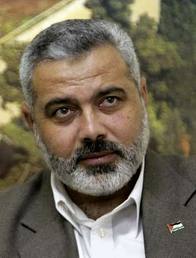 Hundreds of Hamas supporters in Gaza City protested in the streets on February 3 in support of the Eyptian revolutions and against Egypt's president Hosni Mubarak with the apparent tolerance or encouragement of the Hamas government. But later this week, a group of journalists and bloggers who organized their own protest had their protest broken up. Six women and eight men were arrested, and two of the women were beaten.
Hundreds of Hamas supporters in Gaza City protested in the streets on February 3 in support of the Eyptian revolutions and against Egypt's president Hosni Mubarak with the apparent tolerance or encouragement of the Hamas government. But later this week, a group of journalists and bloggers who organized their own protest had their protest broken up. Six women and eight men were arrested, and two of the women were beaten.
In Ramallah rallies were also broken up before they started. The Palestinian Authority police beat protesters with clubs and arrested two at a rally for Egypt in front of the Egyptian embassy on Sunday. "Our rally was simply in support of Egypt," one protester told Ma'an by phone, "we said nothing against the PA, we were not even out in the street." Earlier the same day, the Palestinian Authority had organized a rally in support of Mubarak which accused Egyptian opposition leader Mohammed El Baradei of being a CIA agent. The pro-Mubarak rally attracted a few dozen, the rally for the Egyptian people hundreds.
The rallies now appear to have changed from simply supporting Egypt to including calls for reform in Gaza. A Facebook page appeared on January 28 calling for a revolution in Gaza and naming February 11 a day of protest against the Hamas government. Four days later, another page was set up on Facebook, calling for a revolution in Ramallah and the ouster of President Mahmoud Abbas.
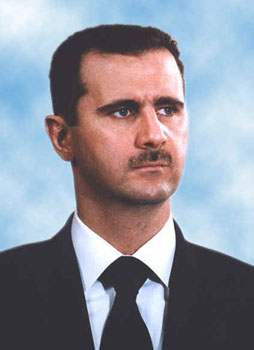 As predicted, Syria's day of rage did not meet with the same response as that of others in the region. "The only rage in Syria yesterday was the rage of nature," wrote Syrian journalist Ziad Haidar, in reference to a cold spell and heavy rain on the day of the protest. While the facebook group promoting the day of rage attracted many followers, there were several key differences separating Syria from Egypt or Tunisia. Facebook is banned in Syria, and the page was reportedly set up by expatriates. Although it gained 15,000 followers by Friday, most were also believed to be non-resident. The Syrian government has been extremely vigilant about quelling opposition to the forty year government of president Bashar al-Assad and his father. The country has an anti-US, anti-Israel foreign policy that is popular at home and Assad is also seen to be slightly more open to change than others in the region.
As predicted, Syria's day of rage did not meet with the same response as that of others in the region. "The only rage in Syria yesterday was the rage of nature," wrote Syrian journalist Ziad Haidar, in reference to a cold spell and heavy rain on the day of the protest. While the facebook group promoting the day of rage attracted many followers, there were several key differences separating Syria from Egypt or Tunisia. Facebook is banned in Syria, and the page was reportedly set up by expatriates. Although it gained 15,000 followers by Friday, most were also believed to be non-resident. The Syrian government has been extremely vigilant about quelling opposition to the forty year government of president Bashar al-Assad and his father. The country has an anti-US, anti-Israel foreign policy that is popular at home and Assad is also seen to be slightly more open to change than others in the region.
Approximately 10,000 political prisoners are currently being held in Syrian jails. A national state of emergency has been in effect in Syria continuously since 1963 and it is consistently used to suppress and punish any dissent. According to Amnesty International's report on Syria for 2010, "Critics, human rights defenders, alleged opponents of the government and others were detained, often for prolonged periods; some were sentenced to prison terms after unfair trials. Torture and other ill-treatment remained common, and were committed with impunity; there were several suspicious deaths in custody. The government failed to clarify the circumstances in which [17 prisoners and five others] were killed at Sednaya Military Prison in 2008 and, again, took no steps to account for thousands of victims of enforced disappearances in previous years. Women faced legal and other discrimination and violence. The Kurdish minority remained subject to discrimination, and thousands of Syrian Kurds were effectively stateless. At least eight prisoners were executed."
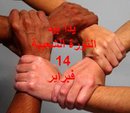 Yesterday in Bahrain, hundreds of protesters gathered after Friday prayers in front of the Egyptian embassy in Manama to support Egypt and also to call for reform of Bahrain's own government. The request to protest was rejected by the Interior Ministry on Monday and again later in the week, but the eight political societies organizing the event managed to obtain permission late on Thursday. The request was rejected on the grounds that it is illegal to hold gatherings near diplomatic missions in Bahrain, even though the same groups were allowed to protest a few kilometres from the Tunisian embassy last month. The groups include Al Wefaq National Islamic Society, Brotherhood Society, National Democratic Action Society (Wa'ad), Islamic Action Society (Amal), Democratic Progressive Tribune, Democratic Gathering Society, National Gathering Society and Islamic Arabic Wasat Society.
Yesterday in Bahrain, hundreds of protesters gathered after Friday prayers in front of the Egyptian embassy in Manama to support Egypt and also to call for reform of Bahrain's own government. The request to protest was rejected by the Interior Ministry on Monday and again later in the week, but the eight political societies organizing the event managed to obtain permission late on Thursday. The request was rejected on the grounds that it is illegal to hold gatherings near diplomatic missions in Bahrain, even though the same groups were allowed to protest a few kilometres from the Tunisian embassy last month. The groups include Al Wefaq National Islamic Society, Brotherhood Society, National Democratic Action Society (Wa'ad), Islamic Action Society (Amal), Democratic Progressive Tribune, Democratic Gathering Society, National Gathering Society and Islamic Arabic Wasat Society.
Bahrain, which is currently ranked 144 out of 178 countries on Reporters Without Borders Press Freedom Index for 2010, has also been looking this week at further censorship of social media in the country, particularly of Facebook. The Bureau of Information and Telecommunications Regulatory Authority are working to develop mechanisms that allow for greater government control of the movement of electronic communication sites, which they say could be used by some to "undermine the achievements of the State and the unity of their people, and this requires constant vigilance and awareness in this aspect". There are an estimated 200 thousand Facebook users in Bahrain, and approximately 70 per cent of them are young people.
This is a first hand eyewitness account from a friend of mine who is in Egypt right now.
25 Jan 11 – The Beginning
I had made up my mind not to go to Tahrir; I had hoped for the best for the protesters. Though the protest was legal, I had a great deal of trepidation about how events could unfold. Hosni Mubarak is well reputed to wield a heavy hand over his people. However a friend wanted to go. Out of concern for him I went. I thought I knew the streets downtown better and could navigate us out more easily. I was wrong.
Map via @Houeida Anouar
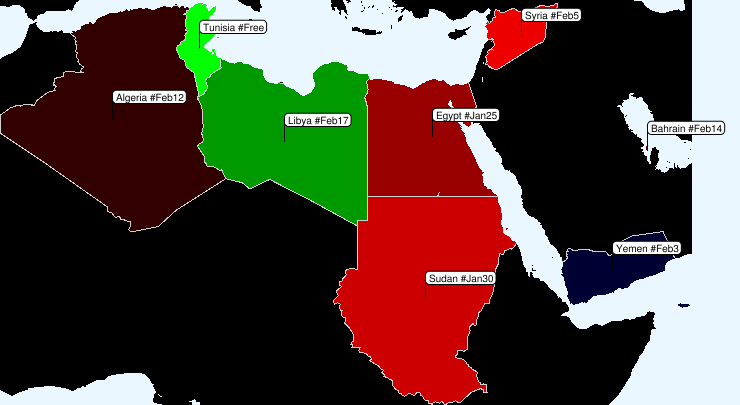
Tunisia December 15:
2011-02-01 Tunisian Islamic Leader Returns as EU Freezes Ousted President's Assets
2011-01-27 Tunisia protests continue as a warrant is issued for Ben Ali
2011-01-24 Tunisia today: "It’s not a unity government, it’s a fake unity government”
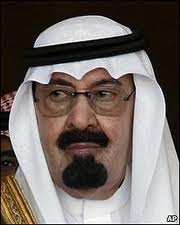 King Abdullah of Saudi Arabia, who has provided a new home for ex-Tunisian president Ben Ali, has been calling Egyptian protesters "infiltrators" who seek to destabilize their country, the state-run Saudi Press Agency reported.
King Abdullah of Saudi Arabia, who has provided a new home for ex-Tunisian president Ben Ali, has been calling Egyptian protesters "infiltrators" who seek to destabilize their country, the state-run Saudi Press Agency reported.
Saudi King Abdullah called Egyptian President Hosni Mubarak and "was reassured". "During the call, the king said, 'Egypt is a country of Arabism and Islam. No Arab and Muslim human being can bear that some infiltrators, in the name of freedom of expression, have infiltrated into the brotherly people of Egypt, to destabilize its security and stability and they have been exploited to spew out their hatred in destruction, intimidation, burning, looting and inciting a malicious sedition.'".
Saudi Arabia "strongly condemns" the protest. Whether Saudi Arabia is itself at risk of revolution or mass protests remains to be seen. On November 13, the Saudi Arabian government declared that facebook had "crossed a line" and restricted access to their approximately 27 million people for a few hours, on morality grounds. It would be unlikely that the Saudi government would tolerate mass protest organizing on social media. But there was reportedly a recent protest below, a very rare event, that may be either an anomaly or a precedent.
 The Interior Ministry of Yemen issued a statement on its website outlining extra security measures it has taken in preparation for Yemen's Day of Rage on February 3. Security forces have been reinforced around Sanaa, the capital, and transportation routes into major cities have security checkpoints added for 'wanted suspects' or firearms. The opposition parties have called for a million protesters march in emulation of Egypt's current demonstrations and asked for members and other supporters outside the capital to join. Around 15,000 protesters marched in Sanaa last Thursday.
The Interior Ministry of Yemen issued a statement on its website outlining extra security measures it has taken in preparation for Yemen's Day of Rage on February 3. Security forces have been reinforced around Sanaa, the capital, and transportation routes into major cities have security checkpoints added for 'wanted suspects' or firearms. The opposition parties have called for a million protesters march in emulation of Egypt's current demonstrations and asked for members and other supporters outside the capital to join. Around 15,000 protesters marched in Sanaa last Thursday.
President Ali Abdullah Saleh announced last week on state TV that he would step down after his second presidential term expires in 2013. He is to address an emergency meeting of the two chambers of the parliament, the House of Deputies and the Shura Council, tomorrow, one day before Yemen's Day of Rage. He is to discuss "issues and developments of interest to the nation and citizens" according to the official Saba news agency.
Protests continue in Khartoum despite violent police suppression which has resulted in one reported death of a protester. Tweets from activists in Khartoum say the government has started blocking some protesters' individual cell phones. On Tuesday, around 200 students were beat back from protesting outside outside al-Nilein university by police who have already arrested and injured many protesters and killed one.
Opposition Islamist Hassan al-Turabi and a dozen members of his party were arrested earlier this month and are being held without charges. The African Center for Justice and Peace Studies released a statement saying "These ongoing rights violations are a pattern to silence dissident voices and limit access to information. The responses undertaken by police forces ... exemplify the extent to which the (ruling party) are unwilling to tolerate any other voices on the road to democratic transformation." They also said that police had detained more than 100 people on Monday and were continuing arrests, with people being taken from their homes and offices. Numbers that have been detained are impossible to keep track of. Rallies are illegal in Sudan without permission, which is rarely given.
At 2:30 PM Egypt time, there are well over a million Egyptians in and around Tahrir Square. The atmosphere is being described by Al Jazeera as a festival atmosphere. CNN has Anderson Cooper reporting from the protests. And, reports are circulating on Twitter indicating Egyptian State TV is running images of Cairo looking serene, void of protesters, and flashing a “Protect Egypt” banner on screen during music videos.
The millions are deliberating over whether to march to the presidential palace or not. Having a foothold in Tahrir Square gives Egyptians control over Cairo, the power to keep the city’s business halted, and that gives them tremendous leverage as the opposition continues to push for Egyptian President Hosni Mubarak to step down.
Rached Ghannouchi, head of the Islamist party Ennahda, returned to Tunisia after 22 years in exile. In a celebration of their newly won freedom, thousands of supporters welcomed him at Tunis Airport on Sunday. Ennahnda has said it intends to take part in Tunisia's post-revolution elections but Ghannouchi told reporters that fears that compare him to the father of Iran's Islamic Revolution were wrong. He said he is much more moderate in his views “Some Western media portray me like (Ayatollah Ruhollah) Khomeini, but that’s not me.”
UPDATE:
9:30pm Cairo - Egypt's President Hosni Mubarak has just given a speech in which he vowed not to run for president in the fall but would not step down until them. He said protests are "manipulated by political forces" in his TV address. Initial reaction from the estimated two million people still protesting in central Cairo is that he has to go now.
6:00pm Cairo - Tweets and news reports we are seeing as the Sun sets in Cairo indicated that the Million Man March has been an overwhelming success. Araby tweets "2 Million in Alexandria. Almost 3 Million in Cairo. Around half a Million Suez. It's happening."
People on Tahrir Square in Cairo where Al Jazeera is reporting 2 million people have gathered are saying that they aren't leaving until Hosni Mubarak does. People are standing shoulder to shoulder in the famed Tahrir Square, the atmosphere is lively but peaceful as protesters wave signs a loft and chant slogans demanding that Mubarak go. Someone even hung an effigy of Mubarak from a street sign. The army has placed barbed wire around Mubarak's residence and they have been checking protesters for weapons as they entered the square but they have done nothing to stop the march.
As WL Central reported yesterday, protesters in Sudan were beaten by riot police as they tried to leave their universities to demonstrate. Today the facebook page for the January 30 demonstration contains a red script proclaiming a martyr. "Al-Gorashy was a martyr for us. And you are our martyr now, Mohammed Abdulrahman", it says, in reference to a student who died this morning in Omdurman hospital after being beaten by the police yesterday.
Al Jazeera reports"Medical sources confirmed to us that the student died yesterday from his injuries inflicted by security forces," said Yasir Arman, the top official in the north of south Sudan's main party, the Sudan People's Liberation Movement (SPLM). Arman condemned the use of force and said the students were trying to hold peaceful demonstrations.
US state cable 08CAIRO2572 from December, 2008 details the experiences of an April 6 activist who attended the December 3-5 "Alliance of Youth Movements Summit, and met with US government officials, on Capitol Hill, and with think tanks. "He alleged that several opposition parties and movements have accepted an unwritten plan for democratic transition by 2011; we are doubtful of this claim. ... April 6's stated goal of replacing the current regime with a parliamentary democracy prior to the 2011 presidential elections is highly unrealistic, and is not supported by the mainstream opposition."
In February, 2010, the Amir of Qatar discussed Syrian relationships with Senator John Kerry. Syrian President Bashar al-Asad, who is currently facing a potential revolution in his country, discusses U.S.-Syrian relations with six US senators in US state cable 10DAMASCUS8 from January, 2010. In the cable he stresses the absence of trust Syria has for the US and the need for the US to take steps to establish trust. The US senators request that Syria "demonstrate goodwill" by gestures such as interceding for them with Iran and reopening an international school which had been shut in 2008 in response to a U.S. military attack on Syrian soil which had killed seven innocent civilians.
It is morning again in Cairo as I post this. The curfew ended at 8:00am and the people of Egypt enter the seventh day of their history making struggle. A famous poem by the early 20th century Tunisian poet Abu al-Qasim al-Shabi, "To the Tyrants of the World" [hear it on NPR] has become a rallying cry in both Tunisia and Egypt.
Millions of Egyptians were in violation of the government curfew again last night after a sixth day in which people have taken to the the streets to demand regime change. What started with tens of thousand of demonstrators only a few days ago in three major cities has now developed to the point where the majority of the people of Egypt from virtually all walks of life are demanding the removal of Hosni Mubarak and all his cronies from power.
This morning the Egyptian army is erecting barricades in central Cairo as the government vows to enforce the curfew which it has moved forward three hours to 3:00pm today. Today also the unions are calling for a general strike throughout Egypt and on Tuesday the April 6 Youth Movement has called for a demonstration of a million Egyptians in Cairo.
Facebook pages are calling for a Syrian Day of Rage on February 5, demanding an improvement in living standards, respect for human rights, freedom of speech for all Syrian citizens, and greater influence for Syrian youth.
Bashar Assad has been the President of Syria since 2000, and before that his father held the post for three decades. Al Jazeera pointed out, Syria, as one of the primary thorns in the side of US influence in the region, is not Egypt or Tunisia. This president has his own facebook page, and his country has not been accused of being a puppet of the US.
"What happened in Tunisia and Egypt was not just about hunger, it was about national pride," said Mazen Bilal, the editor of Suria al-Ghad, a political news website familiar with government thinking.
"Syria is another story. Through all the problems it maintained its national stances and its sovereignty and so people are proud of their nation."
Crucially, as well, the government's reform of the economy is maintaining a system of support to alleviate the worst effects of poverty.
Completely unintentionally, revolution has been the theme of this week. I read Paulo Freire’s Pedagogy Of The Oppressed and saw the musical Fela! courtesy of the National Theatre broadcast. The South Africa retelling of the story of Christ (Son of Man) mirrored Fela! remarkably – for good and ill. The documentary on Antonio Negri (A Revolt That Never Ends) explored the workers movements in Italy in the 70′s, and his academic work on the Multitude since his time in prison.
Sudanese protesting in Khartoum yesterday were attacked and arrested by hundreds of riot police as they chanted "We are ready to die for Sudan," and "Revolution, revolution until victory". The police surrounded the entrances of four universities in the capital, firing teargas and beating students at three of them.
Youth For Change had called for a demonstration on Sunday, January 30 from 11:00am - 2:00pm. Their facebook page attracted 16,864 followers to "Attending the Peace Process in Khartoum, Sudan" and said, "The people of Sudan will not remain silent any more. It is about time we demand our rights and take what's ours in a peaceful demonstration that will not involve any acts of sabotage. We will come out to protest the high cost of living, corruption, nepotism, unemployment and all the practices of the regime, including striking women... that are contrary to the most basic laws of Islam and humanity, and violate the rights of minorities. We will go out to prove to the whole world that the people... will not remain silent in the face of persistent injustice and humiliation.
But Al Jazeera reports
Pro-government newspapers carried front page warnings against protests which they said would cause chaos and turmoil.
The Sudan Vision daily's editorial blamed the opposition.
"Our message to those opposition dinosaurs is to unite their ideas and objectives for the benefit of the citizens if they are really looking for the welfare of the Sudanese people," it read.
The pro-democracy group Girifna ("We're fed up") said nine members were detained the night before the protest and opposition party officials listed almost 40 names of protesters arrested on Sunday. Five were injured, they added.
Theme by Danetsoft and Danang Probo Sayekti inspired by Maksimer